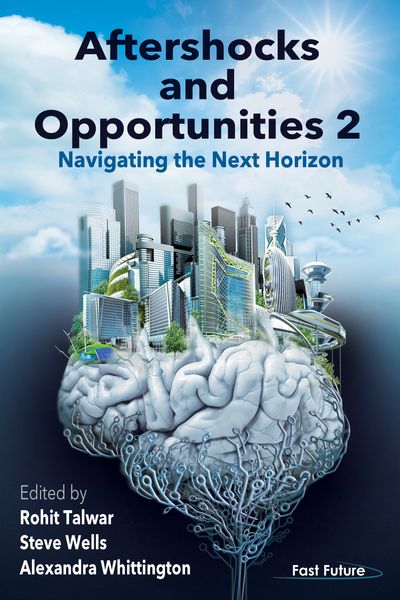Why are US firm buying up towns? Could AI resolve geopolitical conflicts? How might Crypto transform financial markets?
Published:
Read Time: 4 mins
New book Aftershocks and Opportunities 2: Navigating the Next Horizon bursts with provocative ideas, disruptive shifts, hope, dystopian visions, and inspirational possibilities. It explores what opportunities arise from the pandemic, and what might drive the post-pandemic future of society, business, education, health, insurance, and travel.
An agenda setting, thought provoking, challenging, and inspiring book – Aftershocks and Opportunities 2: Navigating the Next Horizon – launches on Tuesday 28 September. The book features 37 world-class futurists, analysts, subject matter experts, and strategists from 16 countries on five continents who explore the shifts, issues, risks, and opportunities that could shape our post-pandemic world, including:
· The crypto economy and a single global currency
· Geopolitical shifts and China-US relations
· Post-pandemic retirement, health, and education
· Regenerating Africa and the Caribbean
· Technological advances and zero waste solutions for food sovereignty
· Global opportunities and risks
· Deep dives on agenda setting and disruptive technologies
· The new normal for national security, lifestyles, and societal cohesion.
Throughout 40 chapters of outlooks, scenarios, and fiction future by authors from as far and wide as the UK, USA, Argentina, Australia, Egypt, Greenland, Kenya, and the UAE, the book explores critical ‘future defining’ themes. The goal is to give individuals, leaders, decision makers, and organisations a broad scan of the horizon and scenarios for key future factors shaping our world over the next five to ten years and beyond
In the book, the 37 future thinkers share their expertise and insights on key topics including exponential advances in science and technology, societal change, medical breakthroughs, economic volatility, and shifts in geopolitical power. Each chapter challenges the reader to think about how these developments might these play out, and the impact they could have on our lives, our communities, our organisations, and our nations.
Many contributors highlight the pandemic as a once in a generation opportunity for positive change; outlining the potential to reset our values, tap into the possibilities created by exponentially advancing technologies and address the deep economic, social, and political impacts of the pandemic. They highlight practical ways in which these possibilities can be harnessed to find a fairer, more progressive, transparent, and sustainable society.
Aftershocks and Opportunities 2: Navigating the Next Horizon covers seven core themes: economics and business; the global operating environment, regional and national futures; society and lifestyles; sectoral futures, innovation and technology, and future frameworks. A wide variety of ideas, scenarios, and possible future paths are discussed in a broad mix of topics that include food sovereignty, travel, insurance, and urban mobility through to leadership skills, physical wellbeing, education, and retirement.
Initiated and edited by global futurists Rohit Talwar, Steve Wells, and Alexandra Whittington from the foresight consultancy Fast Future, the book offers concise, insightful, and action enabling ideas in chapters such as:
· Envisaging the Accelerated Future of the Crypto Economy
· Post-Traumatic Growth: How Might Business Change for the Better
· National Security in the New Normal
· Generational Games: Age Cohort Reactions to the Pandemic
· How Digital Ecosystems Might Shape the Post-Pandemic Recovery
Editor of Aftershocks and Opportunities 2: Navigating the Next Horizon and CEO of Fast Future, Rohit Talwar explains: “The world has run out of adjectives to describe the shockwaves caused by the pandemic and the damage it has done to lives, societies, businesses, economies, and entire nations. From overwhelmed health systems, rising unemployment, and chronic mental health problems through to failed businesses, devasted economies, and a fraying civic infrastructure, the consequences surround us and could leave a lasting legacy. However, in the midst of this continuing global pandemic, we are also witnessing a level of innovation and positive change that most have never experienced in our lifetimes.
“What we are seeing are new ideas, innovations, and behaviours, born from necessity, that are laying down positive foundations to help us transition through and beyond the next horizon. We hope our book will provide provocations that will help ensure our response to the pandemic lays a path to a positive future. Our ambition is to provide individuals, leaders, decisions makers, governments, and organisations with foresight, insight, visionary thinking, and navigational guidance on what lies ahead so we can collectively build a fairer, genuinely inclusive, and more sustainable future for all.”
Aftershocks and Opportunities 2: Navigating New Horizons is available on Amazon. The paperback version costs £12.95 / €14.95 / USD$15.95 and the eBook can be bought for US$9.99 (With a special launch price of US$0.99 for Tuesday September 28 only).
For more information on Fast Future please visit www.fastfuture.com
For further media information contact Sam Jones – sam@bigbangpr.co.uk (+44 07531 625233) or Paula Hunter paula@bigbangpr.co.uk (+44 07739 989915) at Big Bang PR.
Ends
Editors notes
Fast Future specialises in delivering keynote speeches, research, insights, consulting, and executive education to businesses, NGOs, and governments. The company offers proven expertise in the use of foresight to explore the future of humanity, government and governance, the economy, business, emerging sectors, and exponentially advancing fields of science and technology. Fast Future has a particular interest in the impacts of developments such as disruptive thinking, new economic models, geopolitical shifts, the crypto economy, artificial intelligence, and exponential science and technology. Through its work, Fast Future explores how these emerging ideas and developments might impact the planet, life, society, nations, the future of work, and the creation of the trillion-dollar sectors of the future.

